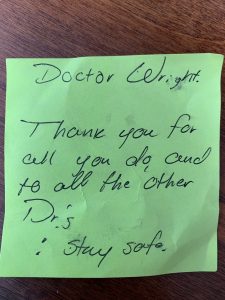 By Brent Wright, M.D., KMA President
By Brent Wright, M.D., KMA President
This week we start anew as we pursue a fresh start in addressing the COVID-19 pandemic. Like many of you during these last several weeks I have worked my way through various stages from disbelief and denial to anger and acceptance. One of the most important things I have experienced during this time is the simple act of human kindness. About a week ago, I found a note on top of my trash can as I was preparing to roll it back to our home. The note said, “Doctor Wright, Thank you for all you do and to all the other Dr.’s: stay safe.”
That simple note and act of caring helped to provide focus. We did not cause this crisis, we are only required to respond and solve it. In these efforts we find our true strength as physicians by utilizing our knowledge, caring, and resilience to serve humanity in the unique ways in which we are trained. And as we serve humanity, we cannot forget how tightly linked we all are in the roles we fulfill and how we serve each other in countless ways that are often taken for granted until a moment when they may cease to exist.
Many challenges await us in the months ahead. We will continue to utilize technology through telemedicine to protect some of the most vulnerable patients among us. We will learn everything there is to know about this novel corona virus in an effort to keep our patients, communities, and fellow healthcare workers safe from its most devastating effect. And we will help to lead a healthcare system that needs to embrace health as a paramount defense to both present and future threats to our well-being.
While we work to explore and create this new normal, I encourage you to share your thoughts, ideas, and hopes with your KMA. Over the coming weeks, KMA will be developing public service announcements that will help patients in returning to their doctor’s offices just as we have helped physician offices in connecting to the resources they need in preparing for this next phase in care delivery. I encourage you to avoid fear in the days ahead and become reinvigorated in the service that binds us together, caring for patients.
Administration Releases Additional Healthcare Reopening Guidelines
This afternoon, Public Health Commissioner Steven Stack, M.D. outlined more details on requirements for various phases of the reopening of healthcare services.
For all phases of reopening, providers and facilities must:
- Use telemedicine/telework instead of in-person whenever possible
- Fever and COVID-19 screening prior to entry into healthcare facility
- Discontinue use of traditional waiting rooms/common areas
- Use non-traditional options, e.g. wait in car, call ahead registration, etc.
- Use modifications to ensure social distancing > 6 feet and/or physical barriers
- Universal masking for all persons for all direct person-person contact
- Enhanced sanitizing and disinfecting; hand sanitizer stations available
- Providers must procure PPE through commercial routes
- No visitors except end-of-life and assisting vulnerable populations
- All phases subject to delay or rollback if COVID-19 surge requires
For Phase I reopening, which began today, April 27:
- Resume non-emergent/non-urgent outpatient healthcare services, including diagnostic laboratory services
- Includes:
- ‘High-touch’ settings (e.g. physical therapy, chiropractic) with enhanced PPE including gloves and eye protection for direct patient manipulation
- ‘High-aerosol’ settings (e.g. dentistry, oral surgery, anesthesia, pulmonary) with enhanced aerosol mitigation proposed by their professional associations
- Non-emergent/non-urgent surgical and invasive procedures are not included in this phase
For Phase II reopening, which begins Wednesday, May 6:
- Outpatient/ambulatory surgery and invasive procedures may resume
- All patients must have COVID-19 pre-procedure testing per professional association and KDPH guidance
- Each facility must maintain 14-day supply of all necessary PPE based on a projected 14-day burn rate for facility
- Type and timing of cases determined by facility-specific procedure prioritization and oversight committee
- For acute care hospitals, maintain at least 30% bed capacity, per facility surge plan, in both ICU and total beds for COVID-19 patients
For Phase III reopening, which begins Wednesday, May 13:
- Non-emergent/non-urgent inpatient surgery and procedures may resume at 50% shutdown volume
- All surgical/procedural patients must have COVID-19 pre-procedure testing per professional guidelines consistent with KDPH guidance
- Each facility must maintain 14-day supply of all necessary PPE based on a projected 14-day burn rate for facility
- Type and timing of cases determined by facility-specific procedure prioritization and oversight committee
- For acute care hospitals, maintain at least 30% bed capacity, per facility surge plan, in both ICU and total beds for COVID-19 patients
For Phase IV reopening, which begins Wednesday, May 27:
- Non-emergent/non-urgent inpatient surgery and procedures may resume at volume determined by each facility
- All patients must have COVID-19 pre-procedure testing per professional guidelines consistent with KDPH guidance
- Each facility must maintain 14-day supply of all necessary PPE based on a projected 14-day burn rate for facility
- Type and timing of cases determined by facility-specific procedure prioritization and oversight committee
- For acute care hospitals, maintain at least 30% bed capacity, per facility surge plan, in both ICU and total beds for COVID-19 patients
More information and the slide deck from today’s press conference will be made available this evening at kycovid19.ky.gov.
CMS Reevaluates Accelerated Payment Program and Suspends Advance Payment Program
On April 26, the Centers for Medicare & Medicaid Services (CMS) announced that it is reevaluating the amounts that will be paid under its Accelerated Payment Program and suspending its Advance Payment Program to Part B suppliers effective immediately.
CMS had expanded these temporary loan programs to ensure providers and suppliers had the resources needed to combat the beginning stages of the COVID-19 pandemic. Funding will continue to be available to hospitals and other health care providers on the front lines of the coronavirus response primarily from the Provider Relief Fund.
Additional funding will continue to be available to hospitals and other health care providers through other programs. Congress appropriated $100 billion in the Coronavirus Aid, Relief, and Economic Security (CARES) Act (PL 116-136) and $75 billion through the Paycheck Protection Program and Health Care Enhancement Act (PL 116-139) for health care providers. HHS is distributing this money through the Provider Relief Fund, and these payments do not need to be repaid.
The CARES Act Provider Relief Fund is being administered through HHS and has already released $30 billion to providers and is in the process of releasing an additional $20 billion, with more funding anticipated to be released soon. This funding will be used to support health care-related expenses or lost revenue attributable to the COVID-19 pandemic and to ensure uninsured Americans can get treatment for COVID-19.
For more information on the CARES Act Provider Relief Fund and how to apply, visit: hhs.gov/providerrelief.
For an updated fact sheet on the Accelerated and Advance Payment Programs, visit: https://www.cms.gov/files/document/Accelerated-and-Advanced-Payments-Fact-Sheet.pdf


